What Time Does the Firing of Fort Sumter What Everything When Was the Talk to Me Again
:focal(1424x726:1425x727)/https://tf-cmsv2-smithsonianmag-media.s3.amazonaws.com/filer/25/43/2543305d-7b54-484a-9f02-e256a1cfd1bb/fortsumter2009.jpg)
On the afternoon of April 11, 1861, a small open boat flying a white flag pushed off from the tip of the narrow peninsula surrounding the city of Charleston. The vessel carried three envoys representing the Amalgamated States government, established in Montgomery, Alabama, two months before. Slaves rowed the passengers the most iii and a one-half miles across the harbor to the looming hulk of Fort Sumter, where Lt. Jefferson C. Davis of the U.South. Army—no relation to the newly installed president of the Confederacy—met the arriving delegation. Davis led the envoys to the fort's commander, Maj. Robert Anderson, who had been holed up there since just after Christmas with a tiny garrison of 87 officers and enlisted men—the last precarious symbol of federal ability in passionately secessionist Due south Carolina.
The Confederates demanded immediate evacuation of the fort. However, they promised prophylactic ship out of Charleston for Anderson and his men, who would exist permitted to acquit their weapons and personal property and to salute the Stars and Stripes, which, the Confederates acknowledged, "Yous have upheld so long...nether the most trying circumstances." Anderson thanked them for such "off-white, manly, and courteous terms." Withal he stated, "Information technology is a demand with which I regret that my sense of honour, and of my obligation to my Government, prevent my compliance." Anderson added grimly that he would be starved out in a few days—if the Amalgamated cannonthat ringed the harbor didn't concoction him to pieces start. Equally the envoys departed and the sound of their oars faded away beyond the gunmetal-grayness water, Anderson knew that civil war was probably only hours away.
One hundred and fifty years afterward, that war's profound implications still reflect inside American hearts, heads and politics, from the lingering consequences of slavery for African-Americans to renewed debates over states' rights and calls for the "nullification" of federal laws. Many in the South have viewed secession a matter of honor and the want to protect a cherished way of life.
Simply the war was unarguably about the survival of the United States as a nation. Many believed that if secession succeeded, it would enable other sections of the state to intermission from the Union for whatsoever reason. "The Civil War proved that a republic could survive," says historian Allen Guelzo of Gettysburg College. "Europe'south despots had long asserted that republics were automatically fated either to succumb to external attack or to atomize from within. The Revolution had proved that we could defend ourselves confronting outside attack. Then we proved, in the creation of the Constitution, that we could write rules for ourselves. Now the third examination had come: whether a democracy could defend itself against internal collapse."
Generations of historians have argued over the crusade of the war. "Everyone knew at the time that the war was ultimately about slavery," says Orville Vernon Burton, a native South Carolinian and author of The Age of Lincoln. "Afterward the war, some began saying that information technology was actually about states' rights, or a disharmonism of two different cultures, or about the tariff, or almost the industrializing North versus the agrarian South. All these interpretations came together to portray the Civil War as a collision of two noble civilizations from which black slaves had been airbrushed out." African-American historians from West.E.B. Du Bois to John Promise Franklin begged to differ with the revisionist view, but they were overwhelmed by white historians, both Southern and Northern, who, during the long era of Jim Crow, largely ignored the importance of slavery in shaping the politics of secession.
Fifty years ago, the question of slavery was so loaded, says Harold Holzer, author of Lincoln President-Elect and other works on the 16th president, that the issue virtually paralyzed the federal commission charged with organizing events commemorating the war's centennial in 1961, from which African-Americans were virtually excluded. (Arrangements for the sesquicentennial have been left to individual states.) At the time, some Southern members reacted with hostility to whatsoever emphasis on slavery, for fearfulness that it would embolden the and so-burgeoning ceremonious rights motion. Simply afterwards were African-American views of the war and its origins finally heard, and scholarly opinion began to shift. Says Holzer, "Just in recent years have we returned to the obvious—that it was about slavery."
As Emory Thomas, writer of The Amalgamated Nation 1861-1865 and a retired professor of history at the University of Georgia, puts it, "The centre and soul of the secession argument was slavery and race. Near white Southerners favored racial subordination, and they wanted to protect the condition quo. They were concerned that the Lincoln assistants would restrict slavery, and they were right."
Of course, in the spring of 1861, no one could foresee either the four-twelvemonth-long war'due south numbing human toll, or its outcome. Many Southerners assumed that secession could be achieved peacefully, while many Northerners thought that a fiddling saber rattling would be sufficient to bring the rebels to their senses. Both sides, of course, were fatally incorrect. "The war would produce a new nation, very different in 1865 from what information technology had been in 1860," says Thomas. The war was a conflict of ballsy dimensions that cost 620,000 American lives, and brought about a racial and economic revolution, fundamentally altering the South's cotton fiber economy and transforming four million slaves from chattel into soldiers, citizens and eventually national leaders.
The route to secession had begun with the nation's founding, at the Constitutional Convention of 1787, which attempted to foursquare the libertarian ideals of the American Revolution with the fact that human beings were held in bondage. Over time, the Southern states would grow increasingly determined to protect their slave-based economies. The founding fathers agreed to conform slavery by granting slave states boosted representation in Congress, based on a formula that counted iii-fifths of their enslaved population. Optimists believed that slavery, a exercise that was becoming increasingly costly, would disappear naturally, and with it balloter baloney. Instead, the invention of the cotton gin in 1793 spurred product of the ingather and with it, slavery. There were nearly 900,000 enslaved Americans in 1800. Past 1860, there were 4 million—and the number of slave states increased accordingly, fueling a sense of impending national crunch over the S's "peculiar institution."
A crisis had occurred in 1819, when Southerners had threatened secession to protect slavery. The Missouri Compromise the next yr, however, calmed the waters. Nether its provisions, Missouri would be admitted to the Union as a slave state, while Maine would exist admitted as a costless state. And, it was agreed, future territories north of a boundary line inside land acquired by the Louisiana Buy of 1803 would be free of slavery. The South was guaranteed parity in the U.Due south. Senate—fifty-fifty as population growth in the free states had eroded the South's advantages in the Firm of Representatives. In 1850, when the access of gold-rich California finally tipped the residual of free states in the Senate in the North's favor, Congress, as a concession to the Southward, passed the Avoiding Slave Law, which required citizens of Northern states to interact with slave hunters in capturing fugitive slaves. But information technology had already become clear to many Southern leaders that secession in defence of slavery was merely a matter of time.
Sectional strife accelerated through the 1850s. In the Due north, the Fugitive Slave Law radicalized fifty-fifty apathetic Yankees. "Northerners didn't want anything to do with slavery," says historian Bernard Powers of the College of Charleston. "The law shocked them when they realized that they could be compelled to abort fugitive slaves in their own states, that they were existence dragged kicking and screaming into entanglement with slavery." In 1854, the Kansas-Nebraska Human activity farther jolted Northerners by opening to slavery western territories that they had expected would remain forever free.
By late the next twelvemonth, the Kansas Territory erupted into guerrilla warfare between pro-slavery and antislavery forces; the violence would leave more than l expressionless. The Supreme Courtroom's Dred Scott decision of 1857 further inflamed Northerners by declaring, in effect, that costless-state laws barring slavery from their own soil were essentially superseded. The conclusion threatened to make slavery a national establishment. John Brownish's raid on Harper's Ferry, in October 1859, seemed to vindicate slave owners' long-standing fear that abolitionists intended to invade the Due south and liberate their slaves by strength. In 1858, Abraham Lincoln, declaring his candidacy for the Senate, succinctly characterized the dilemma: "I believe this government cannot endure permanently half slave and half free."
For the South, the last harbinger was Lincoln'due south ballot to the presidency in 1860, with only 39.8 percentage of the vote. In a four-way contest against Northern Democrat Stephen A. Douglas, Constitutional Unionist John Bell and the South's favorite son, Kentucky Democrat John Breckenridge, Lincoln received non a unmarried electoral vote southward of the Mason-Dixon line. In her diary, Charleston socialite Mary Boykin Chesnut recounted the reaction she had overheard on a train when news of Lincoln's election was appear. 1 passenger, she recalled, had exclaimed: "Now that...radical Republicans have the power I suppose they will [John] Chocolate-brown united states of america all."Although Lincoln hated slavery, he was far from an abolitionist; he believed freed blacks should be sent to Africa or Key America, and declared explicitly that he would not tamper with slavery where it already existed. (He did brand clear that he would oppose the expansion of slavery into new territories.)
However, the then-called Fire-eaters, the most radical Southern nationalists who dominated Southern politics, were no longer interested in compromise. "S Carolina will secede from the Union every bit surely as that night succeeds the day, and nothing can now preclude or delay it merely a revolution at the North," Southward Carolinian William Trenholm wrote to a friend. "The...Republican party, inflamed by fanaticism and blinded past arrogance, accept leapt into the pit which a just Providence prepared for them." In Charleston, cannon were fired, martial music was played, flags were waved in every street. Men immature and onetime flocked to bring together militia companies. Even children delivered "resistance speeches" to their playmates and strutted the lanes with bootleg banners.
In December 1860, a little more than than a month after Lincoln's election, South Carolina's secession convention, held in Charleston, chosen on the South to join "a dandy Slaveholding Confederacy, stretching its arms over a territory larger than any power in Europe possesses." While almost Southerners did non ain slaves, slave owners wielded power far beyond their numbers: more than xc percentage of the secessionist conventioneers were slaveholders. In breaking upwardly the Spousal relationship, the South Carolinians claimed, they were simply post-obit the founding fathers, who had established the The states as a "union of slaveholding States." They added that a regime dominated by the North must sooner or subsequently lead to emancipation, no matter what the Northward claimed. Delegates flooded into the streets, shouting, "Nosotros are adrift!" equally church bells rang, bonfires roared and fireworks shot through the heaven.
By 1861, Charleston had witnessed economic decline for decades. Renowned for its residents' genteel manners and its gracious compages, the urban center was rather like a "distressed elderly gentlewoman....a little gone downwardly in the globe, yet remembering notwithstanding its former dignity," as one visitor put information technology. Information technology was a cosmopolitan city, with pregnant minorities of French, Jews, Irish gaelic, Germans—and some 17,000 blacks (82 percent of them slaves), who made upwardly 43 percent of the total population. Charleston had been a eye of the slave trade since colonial times, and some 40 slave traders operated within a two-square-block area. Even equally white Charlestonians boasted publicly of their slaves' loyalty, they lived in fear of an uprising that would slaughter them in their beds. "People talk before [slaves] every bit if they were chairs and tables," Mary Chesnut wrote in her diary. "They make no sign. Are they stolidly stupid? or wiser than nosotros are; silent and strong, biding their fourth dimension?"
According to historian Douglas R. Egerton, author of Yr of Meteors: Stephen Douglas, Abraham Lincoln, and the Election that Brought on the Ceremonious War, "To win over the yeoman farmers—who would current of air upwards doing nearly all the fighting—the Fire-eaters relentlessly played on race, warning them that, unless they supported secession, within ten years or less their children would be the slaves of Negroes."
Despite its reject, Charleston remained the Confederacy's near important port on the Southeast coast. The spectacular harbor was defended by three federal forts: Sumter; tiny Castle Pinckney, one mile off the metropolis'due south Battery; and heavily armed Fort Moultrie, on Sullivan's Island, where Major Anderson's command was based but where its guns pointed out to sea, making it caught from state.
On Dec 27, a calendar week after South Carolina'due south proclamation of secession, Charlestonians awoke to detect that Anderson and his men had slipped away from Fort Moultrie to the more defensible Fort Sumter. For secessionists, Anderson'southward motility "was like casting a spark into a mag," wrote 1 Charlestonian, T. W. Moore, to a friend. Although a military setback for Confederates, who had expected to musculus the federal troops out of Moultrie, Anderson's motion enabled the Fire-eaters to blame Washington for "defying" South Carolina's peaceable efforts to secede.
Fort Sumter had been planned in the 1820s as a bastion of coastal defense, with its five sides, an interior large enough to business firm 650 defenders and 135 guns commanding the shipping channels to Charleston Harbor. Construction, however, had never been completed. Only fifteen cannon had been mounted; the interior of the fort was a construction site, with guns, carriages, stone and other materials stacked about. Its 5-foot-thick brick walls had been designed to withstand whatever cannonballs that might be hurled—by the navies of the 1820s, according to Rick Hatcher, the National Park Service historian at the fort. Although no one knew information technology at the time, Fort Sumter was already obsolete. Even conventional guns pointed at the fort could lob cannonballs that would destroy brick and mortar with repeated pounding.
Anderson'due south men hailed from Ireland, Germany, England, Denmark and Sweden. His forcefulness included native-born Americans every bit well. The garrison was secure against infantry assail but nearly totally isolated from the outside world. Conditions were dour. Nutrient, mattresses and blankets were in brusk supply. From their thick-walled casements, the gunners could see Charleston's steeples and the ring of islands where gangs of slaves and soldiers were already erecting bastions to protect the Southern artillery.
Militiamen itching for a fight flooded into Charleston from the surrounding countryside. There would soon be more than 3,000 of them facing Fort Sumter, commanded by the preening and punctilious Pierre Gustave Toutant Beauregard, who had resigned his position as W Betoken's superintendent to offer his services to the Confederacy.
"To testify it was a land, the South had to prove that it had sovereignty over its territory," says historian Allen Guelzo. "Otherwise no one, specially the Europeans, would take them seriously. Sumter was like a huge flag in the center of Charleston Harbor that declared, in result, 'You lot don't have the sovereignty that y'all merits.' "
With communications from his superiors reaching him only sporadically, Anderson was entrusted with heavy responsibilities. Although Kentucky born and bred, his loyalty to the Marriage was unshakeable. In the months to come up, his 2nd-in-command, Capt. Abner Doubleday—a New York abolitionist, and the homo who was long credited, incorrectly, with inventing baseball—would express frustration at Anderson'south "inaction." "I take no doubt he thought he was rendering a real service to the land," Doubleday afterwards wrote. "He knew the first shot fired by us would light the flames of a ceremonious war that would quake the world, and tried to put off the evil day as long equally possible. Yet a better assay of the situation might have taught him that the contest had already commenced and could no longer be avoided." Simply Anderson was a good choice for the role that befell him. "He was both a seasoned soldier and a diplomat," says Hatcher. "He would exercise merely about annihilation he could to avoid state of war. He showed tremendous restraint."
Anderson's afar commander in principal was the lame-duck president, Democrat James Buchanan, who passively maintained that while he believed secession to exist illegal, there was nothing he could do about it. A Northerner with Southern sympathies, Buchanan had spent his long career all-around the S, fifty-fifty to the point of assuasive South Carolina to seize all the other federal properties in the country. For months, every bit the crunch deepened, Buchanan had vacillated. Finally, in Jan, he dispatched a paddle cycle steamer, Star of the W, carrying a cargo of provisions and 200 reinforcements for the Sumter garrison. But when Amalgamated batteries fired on her at the entrance to Charleston Harbor, the ship's skipper turned the ship around and fled north, leaving Anderson'southward men to their fate. This ignominious expedition represented Buchanan's simply attempt to assert federal ability in the waters off Charleston.
Some were convinced the Matrimony was finished. The British vice-consul in Charleston, H. Pinckney Walker, saw the government's failure to resupply Fort Sumter as proof of its impotence. He predicted the Northward would splinter into two or iii more republics, putting an end to the United States forever. The Confederacy, he wrote, formed what he called "a very nice little plantation" that could look forward to "a career of prosperity such as the globe has not before known." Popular sentiment in Charleston was reflected in the ardently secessionist Charleston Mercury, which scoffed that federal power was "a wretched braggadocio—a scarecrow—a muddied bundle of red rags and old clothes" and Yankee soldiers but "poor hirelings" who would never fight. The paper dismissed Lincoln as a "vain, ignorant, low fellow."
While Buchanan dithered, vi more states seceded: Mississippi, Florida, Alabama, Georgia, Louisiana and Texas. On February 4, the Confederate States of America declared its independence in Montgomery, Alabama, and named Mexican War hero, erstwhile Secretary of War and senator from Mississippi Jefferson Davis, its president. "The radicals felt they were making a revolution, similar Tom Paine and Samuel Adams," says Emory Thomas. Although Davis had long argued for the correct of secession, when it finally came he was ane of few Confederate leaders who recognized that it would probably mean a long and encarmine war. Southern senators and congressmen resigned and headed southward.
Secessionists occupied federal forts, arsenals and customhouses from Charleston to Galveston, while in Texas, David Twiggs, commander of federal forces at that place, surrendered his troops to the state militia and joined the Amalgamated Regular army. Soon the only pregnant Southern posts that remained in federal easily were Fort Sumter and Florida's Fort Pickens, at the archway to Pensacola Harbor. "The tide of secession was overpowering," says Thomas. "It was like the moment after Pearl Harbor—people were ready to go to state of war." Buchanan at present wanted cipher more than to dump the whole mess in Lincoln'southward lap and retire to the quietude of his estate in Pennsylvania. But Lincoln would not take role until March 4. (Not until 1933 was Inauguration Twenty-four hours moved upward to January xx.)
The new president who slipped quietly into Washington on February 23, forced to keep a low profile because of credible expiry threats, was convinced that war could still exist avoided. "Lincoln had been a compromiser his whole life," says Orville Vernon Burton. "He was naturally flexible: as a lawyer, he had ever invited people to settle out of courtroom. He was willing to live with slavery where it already was. Merely when it came to the honor of the The states, there was a point beyond which he wouldn't go."
Once in function, Lincoln entered into a loftier-stakes strategic adventure that was all but invisible to the isolated garrison at Fort Sumter. It was in the Confederacy'southward interest to provoke a confrontation that fabricated Lincoln appear the assailant. Lincoln and his directorate believed, however, that secessionist sentiment, ruddy-hot in the Deep Due south, was only lukewarm in the Upper South states of Virginia, North Carolina, Tennessee and Arkansas, and weaker all the same in the iv slaveholding border states of Delaware, Maryland, Kentucky and Missouri. Conservatives, including Secretary of State William H. Seward, urged the president to appease the Deep S and evacuate the fort, in hopes of keeping the remaining slave states in the Matrimony. But Lincoln knew that if he did so, he would lose the conviction of both the Republican Political party and most of the North.
"He had such organized religion in the idea of Union that he hoped that [moderates] in the Upper South would never let their states secede," says Harold Holzer. "He was also one of the bang-up brinksmen of all fourth dimension." Although Lincoln was committed to retaking federal forts occupied by the rebels and to defending those still in government hands, he indicated to a delegation from Richmond that if they kept Virginia in the Marriage, he would consider relinquishing Sumter to South Carolina. At the same time, he reasoned that the longer the standoff over Fort Sumter continued, the weaker the secessionists—and the stronger the federal government—would wait.
Lincoln initially "believed that if he didn't allow the South to provoke him, war could be avoided," says Burton. "He besides thought they wouldn't actually fire on Fort Sumter." Considering negotiating directly with Jefferson Davis would have unsaid recognition of the Confederacy, Lincoln communicated only with Due south Carolina'southward secessionist—simply all the same duly elected—governor, Francis Pickens. Lincoln made articulate that he intended to acceleration vessels carrying supplies and reinforcements to Fort Sumter: if the rebels fired on them, he warned, he was prepared to land troops to enforce the federal government's authorisation.
Rumors flew in every direction: a federal ground forces was set to invade Texas...the British and French would intervene...Northern businessmen would come out en masse against state of war. In Charleston, the mood fluctuated betwixt overwrought excitement and dread. Past the end of March, subsequently three cold, damp months camped on the sand dunes and ophidian-infested islands around Charleston Harbor, Fort Sumter's attackers were growing feverishly impatient. "It requires all the wisdom of their superiors to go on them absurd," wrote Caroline Gilman, a transplanted Northerner who had embraced the secessionist cause.
For a month afterwards his inauguration, Lincoln weighed the political cost of relieving Fort Sumter. On April 4, he came to a decision. He ordered a modest flotilla of vessels, led past Navy Capt. Gustavus Vasa Fob, to canvas from New York, conveying supplies and 200 reinforcements to the fort. He refrained from sending a full-calibration fleet of warships. Lincoln may have concluded that state of war was inevitable, and information technology would serve the federal government's interest to cause the rebels to fire the first shot.
The South Carolinians had fabricated clear that whatever attempt to reinforce Sumter would mean war. "At present the issue of battle is to exist forced upon united states," declared the Charleston Mercury. "We volition run across the invader, and the God of Battles must decide the effect between the hostile hirelings of Abolitionism hate and Northern tyranny."
"How tin one settle downwards to anything? 1's heart is in ane's mouth all the time," Mary Chesnut wrote in her diary. "The air is ruby-hot with rumors." To interruption the tension on occasion, Chesnut crept to her room and wept. Her friend Charlotte Wigfall warned, "The slave-owners must await a servile insurrection."
In the early hours of Apr 12, approximately 9 hours after the Confederates had outset asked Anderson to evacuate Fort Sumter, the envoys were once more rowed out to the garrison. They made an offer: if Anderson would state when he and his men intended to quit the fort, the Confederates would hold their fire. Anderson chosen a council of his officers: How long could they hold out? Five days at most, he was told, which meant three days with virtually no nutrient. Although the men had managed to mount nearly 45 cannon, in addition to the original 15, not all of those could be trained on Confederate positions. Notwithstanding, every human at the table voted to pass up firsthand surrender to the Confederates.
Anderson sent back a message to the Confederate regime, informing them that he would evacuate the fort, just non until noon on the 15th, adding, "I volition not in the meantime open up my burn down upon your forces unless compelled to do so by some hostile act against this fort or the flag of my Government."
But the Confederacy would tolerate no farther delay. The envoys immediately handed Anderson a statement: "Sir: Past authority of Brigadier-General Beauregard, commanding the provisional forces of the Amalgamated States, we take the award to notify you lot that he will open up the fire of his batteries on Fort Sumter in one hour from this time."
Anderson roused his men, informing them an attack was imminent. At 4:thirty a.m., the heavy thud of a mortar broke the stillness. A single shell from Fort Johnson on James Isle rose high into the still-starry heaven, curved down and outburst directly over Fort Sumter. Confederate batteries on Morris Island opened up, and then others from Sullivan'southward Isle, until Sumter was surrounded by a ring of burn. Every bit geysers of brick and mortar spumed up where balls striking the ramparts, shouts of triumph rang from the insubordinate emplacements. In Charleston, families past the thousands rushed to rooftops, balconies and downwardly to the waterfront to witness what the Charleston Mercury would describe as a "Splendid Pyrotechnic Exhibition."
To conserve pulverisation cartridges, the garrison endured the bombardment without reply for two and a one-half hours. At 7 a.m., Anderson directed Doubleday to return burn from about 20 guns, roughly one half every bit many as the Confederates. The Union volley sent vast flocks of water birds rocketing skyward from the surrounding marsh.
At about x a.m., Capt. Truman Seymour replaced Doubleday'due south wearied crew with a fresh detachment.
"Doubleday, what in the world is the matter here, and what is all this uproar almost?" Seymour inquired dryly.
"There is a trifling departure of opinion between usa and our neighbors opposite, and nosotros are trying to settle it," the New Yorker replied.
"Very well," said Seymour, with mock graciousness. "Do you wish me to take a hand?"
"Aye," Doubleday responded. "I would similar to have y'all go in."
At Fort Moultrie, now occupied by the Confederates, federal shots hit bales of cotton that insubordinate gunners were using as bulwarks. At each detonation, the rebels gleefully shouted, "Cotton is falling!" And when a shot exploded the kitchen, bravado loaves of bread into the air, they cried, "Breadstuffs are rising!"
Humor was less on display in the aloof homes of Charleston, where the roar of arms began to rattle even the most devout secessionists. "Some of the broken-hearted hearts lie on their beds and moan in lonely misery," trying to reassure themselves that God was really on the Amalgamated side, recorded Chesnut.
At the height of the bombardment, Play tricks's relief flotilla at terminal hove into sight from the north. To the federals' dismay, however, Trick's ships connected to look off the coast, beyond range of rebel guns: their captains hadn't bargained on finding themselves in the center of an artillery duel. The sight of reinforcements and so tantalizingly shut was maddening to those on Sumter. Only even Doubleday admitted that had the ships tried to enter the harbor, "this course would probably have resulted in the sinking of every vessel."
The bombardment slackened during the rainy night only kept on at fifteen-minute intervals, and began again in hostage at iv a.m. on the 13th. Roaring flames, dense masses of swirling fume, exploding shells and the sound of falling masonry "made the fort a pandemonium," recalled Doubleday. Wind drove smoke into the already claustrophobic casements, where Anderson's gunners nigh suffocated. "Some lay down close to the footing, with handkerchiefs over their mouths, and others posted themselves almost the embrasures, where the smoke was somewhat lessened by the draught of air," recalled Doubleday. "Everyone suffered severely."
At ane:30 p.m., the fort's flagstaff was shot abroad, although the flag itself was soon reattached to a short spar and raised on the parapet, much to the disappointment of rebel marksmen. As fires crept toward the powder magazine, soldiers raced to remove hundreds of barrels of powder that threatened to blow the garrison into the cloudless heaven. As the supply of cartridges steadily shrank, Sumter'southward guns roughshod silent one by one.
Presently subsequently the flagpole fell, Louis Wigfall, married man of Charlotte Wigfall and a old U.S. senator from Texas now serving under Beauregard, had himself rowed to the fort under a white flag to phone call again for Anderson'southward give up. The grandstanding Wigfall had no formal dominance to negotiate, simply he offered Anderson the aforementioned terms that Beauregard had offered a few days earlier: Anderson would exist allowed to evacuate his command with dignity, arms in manus, and be given unimpeded send to the North and permission to salute the Stars and Stripes.
"Instead of noon on the 15th, I will go now," Anderson quietly replied. He had made his stand up. He had virtually no pulverization cartridges left. His brave, hopelessly outgunned band of men had defended the national honor with their lives without respite for 34 hours. The outcome was non in question.
"Then the fort is to be ours?" Wig-fall eagerly inquired.
Anderson ordered a white flag to be raised. Firing from rebel batteries ceased.
The understanding nearly collapsed when iii Confederate officers showed up to request a give up. Anderson was then furious at having capitulated to the freelancing Wigfall that he was about to sew together the flag yet again. Yet, he was persuaded to await until confirmation of the terms of surrender, which arrived soon afterwards from Beauregard.
When news of the surrender at last reached the besieging rebels, they vaulted onto the sand hills and cheered wildly; a horseman galloped at total speed along the beach at Morris Isle, waving his cap and exulting at the tidings.
Fort Sumter lay in ruins. Flames smoldered amid the shot-pocked battlements, dismounted cannon and charred gun carriages. Astoundingly, despite an estimated 3,000 cannon shots fired at the fort, not a single soldier had been killed on either side. Simply a handful of the fort's defenders had even been injured by fragments of concrete and mortar.
Beauregard had agreed to allow the defenders to salute the U.S. flag earlier they departed. The next afternoon, Sunday, April xiv, Fort Sumter's remaining arms began a rolling cannonade of what was meant to total 100 guns. Tragically, however, one cannon fired prematurely and blew off the right arm of a gunner, Pvt. Daniel Hough, killing him almost instantly and fatally wounding some other Marriage soldier. The ii men thus became the commencement fatalities of the Civil War.
At 4:thirty p.m., Anderson handed over control of the fort to the South Carolina militia. The exhausted, blue-clad Union soldiers stood in formation on what remained of the parade ground, with flags flying and drums beating out the tune of "Yankee Doodle." Within minutes, the flags of the Confederacy and S Carolina were snapping over the blasted ramparts. "Wonderful, miraculous, unheard of in history, a bloodless victory!" exclaimed Caroline Gilman in a letter to one of her daughters.
A steamboat lent by a local businessman carried Anderson'due south boxing-weary band out to the federal armada, by hordes of joyful Charlestonians gathered on steamers, sailboats bobbing rowboats and dinghies, under the eyes of insubordinate soldiers poised silently on the shore, their heads bared in an unexpected gesture of respect. Physically and emotionally drained, and halfway starved, Anderson and his men gazed back toward the fort where they had made grim history. In their future lay the slaughter pens of Balderdash Run, Shiloh, Antie-tam, Gettysburg, Chickamauga and hundreds more than nonetheless unimaginable battlefields from Virginia to Missouri. The Civil War had begun.
Fergus Bordewich's most recent volume is Washington: The Making of the American Capital. Photographer Vincent Musi is based in Charleston, South Carolina.
Source: https://www.smithsonianmag.com/history/fort-sumter-the-civil-war-begins-1018791/
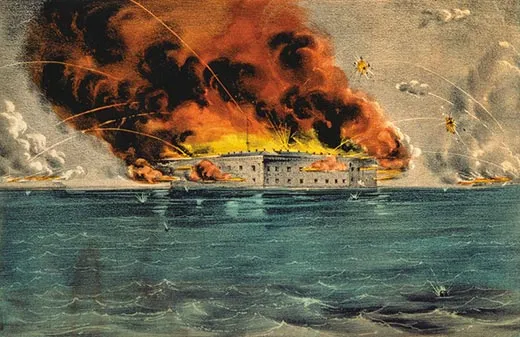
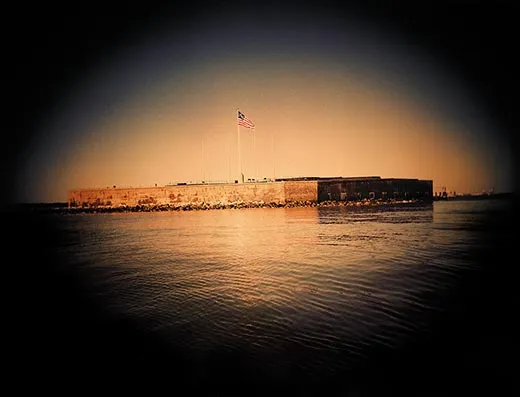
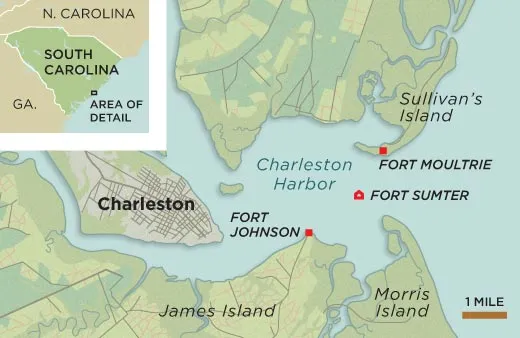
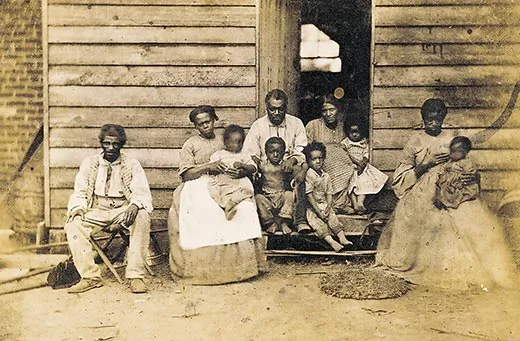
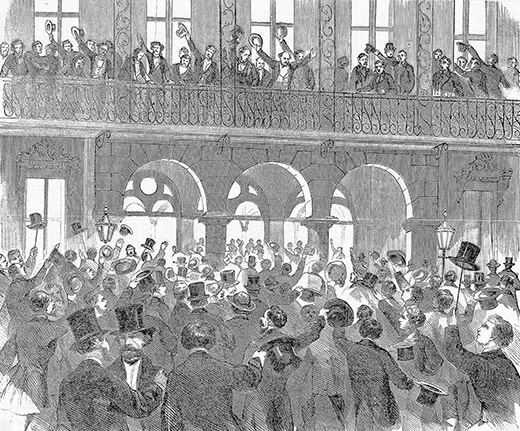
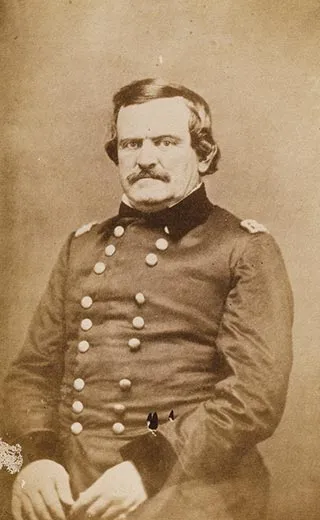
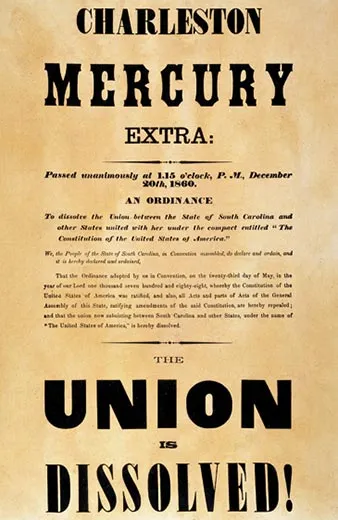
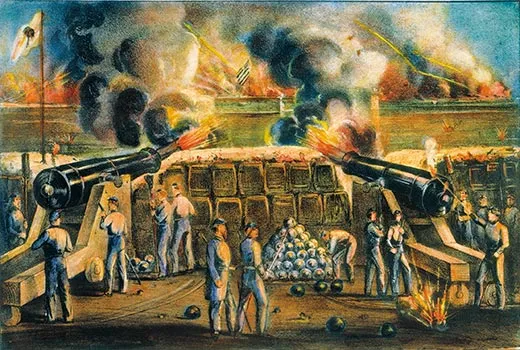
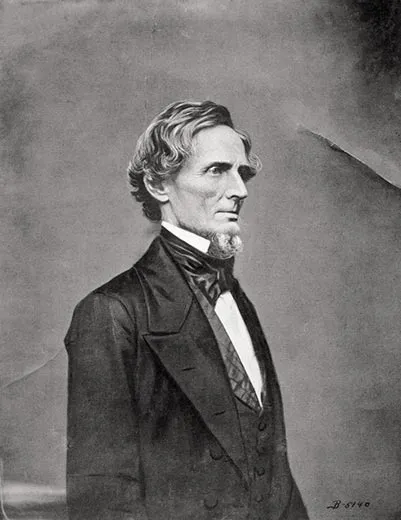
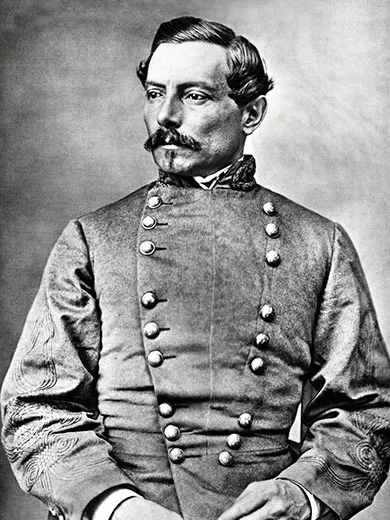
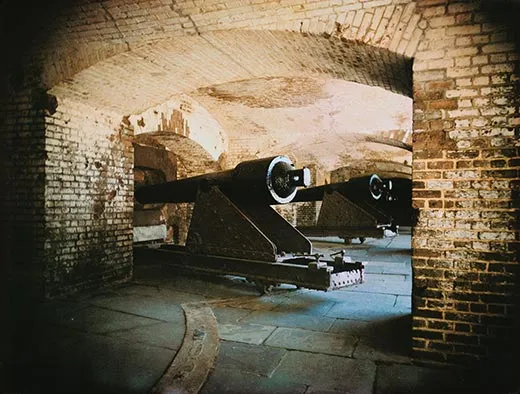
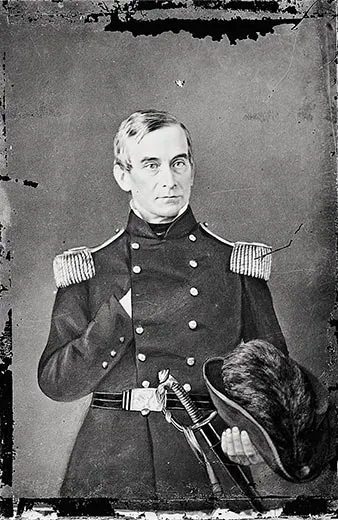
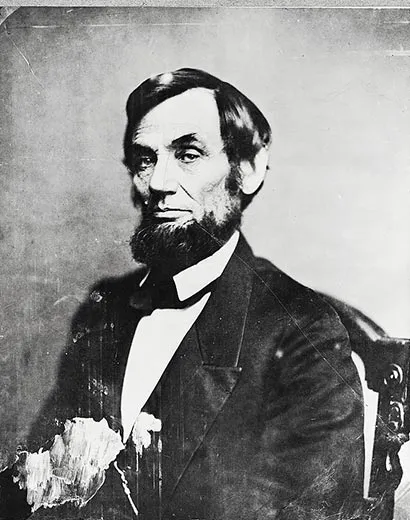
0 Response to "What Time Does the Firing of Fort Sumter What Everything When Was the Talk to Me Again"
Post a Comment